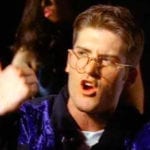 History
History  History
History  Movies and TV
Movies and TV 10 Movie Adaptations That Ruined Everything for Some Fans
 History
History 10 Dirty Government Secrets Revealed by Declassified Files
 Weird Stuff
Weird Stuff 10 Wacky Conspiracy Theories You Will Need to Sit Down For
 Movies and TV
Movies and TV 10 Weird Ways That TV Shows Were Censored
 Our World
Our World 10 Places with Geological Features That Shouldn’t Exist
 Crime
Crime 10 Dark Details of the “Bodies in the Barrels” Murders
 Animals
Animals The Animal Kingdom’s 10 Greatest Dance Moves
 Movies and TV
Movies and TV 10 Box Office Bombs That We Should Have Predicted in 2025
 History
History 10 Extreme Laws That Tried to Engineer Society
 History
History 10 Wars That Sound Made Up (but Absolutely Happened)
 Movies and TV
Movies and TV 10 Movie Adaptations That Ruined Everything for Some Fans
 History
History 10 Dirty Government Secrets Revealed by Declassified Files
Who's Behind Listverse?

Jamie Frater
Head Editor
Jamie founded Listverse due to an insatiable desire to share fascinating, obscure, and bizarre facts. He has been a guest speaker on numerous national radio and television stations and is a five time published author.
More About Us Weird Stuff
Weird Stuff 10 Wacky Conspiracy Theories You Will Need to Sit Down For
 Movies and TV
Movies and TV 10 Weird Ways That TV Shows Were Censored
 Our World
Our World 10 Places with Geological Features That Shouldn’t Exist
 Crime
Crime 10 Dark Details of the “Bodies in the Barrels” Murders
 Animals
Animals The Animal Kingdom’s 10 Greatest Dance Moves
 Movies and TV
Movies and TV 10 Box Office Bombs That We Should Have Predicted in 2025
 History
History 10 Extreme Laws That Tried to Engineer Society
Top 10 Olympic Games Songs
From Diana Ross’ penalty-missing performance at the 1994 World Cup to Janet Jackson’s wardrobe malfunction at the 2004 Superbowl, the world of sport has always had a strong connection with the world of pop. But it’s the music of the Olympics which perhaps best embodies the true spirit of sport’s battle for glory. Ahead of the London 2012 Games, here’s a look at ten of the best songs which have inspired athletes to ‘achieve their dreams,’ ‘triumph over insurmountable odds’ and ‘become instant heroes’ over the past 30 years.
Featuring the obligatory key change, mass children’s choir and big-lunged glory note, “The Flame” may have adhered to every rule in the Olympic theme handbook, but was far superior to Sydney 2000’s other official anthems from teen idols Nikki Webster (the sickly sweet “We’ll Be One”) and Vanessa Amorosi (the Mariah-aping “Heroes Live Forever”). Making the most of the chance to showcase her underrated powerhouse vocals to hundreds of millions of viewers worldwide, Victoria chanteuse Tina Arena, best-known for her 1995 hit “Chains,” provided a master-class in how to turn a rather mediocre song into something rather captivating.
An official song for the London 2012 torch relay rather than the Games itself, “Spinnin’ For 2012” is one of the few Olympic themes which manages to think outside the box, fusing Winehouse-esque retro soul (courtesy of Amy’s god-daughter, Dionne Bromfield), a hip-pop MC delivery from grime’s most diminutive star, Tinchy Stryder, and the ubiquitous sound of dub step to produce a feel-good track which reflects the capital’s contemporary urban scene. Its London-centric vibes may alienate those so far unaccustomed to the concept of the wobble bass, but it’s one of the few Olympics songs you can imagine finding its way onto at least some of the athletes’ iPods.
Continuing Barcelona’s love affair with opera, “Amigos Para Siempre (Friends For Life)” may not be as iconic as the Freddie Mercury & Montserrat Caballe anthem it replaced, but nevertheless, it’s still a valiant effort to replicate its rousing and emotionally-stirring qualities. Co-written by legendary composer Andrew Lloyd Webber and lyricist Don Black, there’s an understandable sense of musical theater melodrama about the whole charade. But with Carreras’ booming tenor, Brightman’s exquisite soprano and a suitably grandiose orchestral crescendo, its closing ceremony performance proved to be a fitting finale for such a thrilling and dramatic Olympic Games.
Overshadowed by Gloria Estefan’s official theme, “The Power Of The Dream” has become little more than a minor footnote in Celine Dion’s extensive discography, not exactly helped by the fact that Japan was bizarrely the only country where it was released. Backed by the Atlanta Symphony Orchestra, the Centennial Choir and David Foster on piano, Dion’s performance of the string-soaked gospel-tinged ballad (co-penned by Babyface) kick-started the 1996 opening ceremony with a bang, although rather subversively, she went onto donate all the money she received for the occasion to her native Canadian Olympics team.
After host city Athens had rocked the boat with their surprising left-field choice four years earlier, Beijing decided to play it a little safer in 2008, recruiting Mandopop singer Liu Huan and Sarah Brightman, back for her second Olympics theme, to reflect the Games’ message of ‘One World, One Dream.’ Written by Shanghai-born French Chinese composer Qigang Chen, classical pop ballad “You And Me” is a far more delicate and restrained number than the former Mrs Lloyd Webber’s 1992 Jose Carreras collaboration, but its simplicity and subtlety provided a neat contrast to the bombastics of the stunning opening ceremony.
From electro pioneer Giorgio Moroder’s synth beats, to Lee Seung Kyu’s best Michael Bolton impression, to its ‘We Are The World’-style chorus, bilingual quartet Koreana’s ode to unity, “Hand In Hand,” is about as quintessentially ’80s as you could possibly wish for. The official anthem for Seoul 1988 may be more ‘The Land Of The Free’ than ‘The Land Of The Morning Calm,’ but while any oriental influences are restricted firmly to its middle-eight, it’s difficult to resist the uplifting charms of its arm-swaying harmonies, clattering tribal rhythms and peace-loving ideals.
One of the few songs to maintain a legacy outside of its Olympic origins, “One Moment In Time” not only became one of the late Whitney Houston’s most enduring ’80s hits, but also set the template for the motivational power ballad. Co-written by Albert Hammond for Seoul 1988, the UK number one single has since become synonymous with the Games thanks to its montage video, (featuring slow motion footage of Carl Lewis and Florence Griffith Joyner), while Houston’s rendition of the song at the 1989 Grammy Awards is widely regarded as one of her greatest ever performances.
By far the most abstract and experimental official Olympic anthem there’s ever likely to be, Grammy nominated “Oceania” is a typically ambitious affair about the evolution of mankind, performed from the perspective of the ocean. Indeed, adhering to the avant-garde approach of her Medulla album, its haunting production, composed entirely of a cappella vocals (courtesy of a London choir) and Shlomo’s beat-boxing skills, is the complete antithesis of the usual sing-along formula. Bjork’s refreshing take on the genre is magical from start to finish, as was her opening ceremony performance, when her large dress unraveled to eventually form a map of the world which covered the entire stadium.
If anyone was qualified to sing about overcoming adversity to reach a particular goal, it was Gloria Estefan. Forced to undergo a year of intense physical therapy after fracturing her spine in a bus crash just six years earlier, the Cuban star’s ability to relate to its empowering lyrics ensured that “Reach” became arguably the Olympics’ most awe-inspiring theme. Even without knowing her eventful backstory, it’s a powerful listen, as its slow-burning acoustic verses make way for a flurry of tribal drums, fluttering pan pipes and soaring melodies that are as hypnotic as they are motivating.
Recorded five years before the 1992 Games, “Barcelona” is as dramatic, theatrical and as brilliantly over-the-top as you’d expect from such a charismatic and flamboyant vocalist as Freddie Mercury. Reveling in the opportunity to embrace his operatic leanings, the Queen frontman secured the talents of larger-than-life Spanish soprano Montserrat Cabaille for an unforgettable ode to the Spanish host city. Following Mercury’s tragic AIDS-related death in 1991, the song was never performed at either of the official ceremonies, but such is its power, it remains the Olympic theme against which all others are judged.








